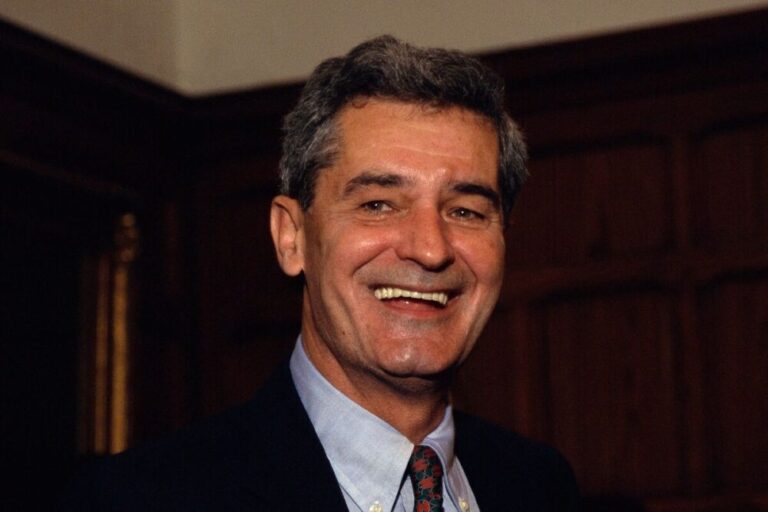Robert E. Lucas Jr. was a longtime economics professor at the University of Chicago who was awarded the Nobel Memorial Prize in economic sciences in 1995 based on his theory that challenged and ultimately altered economists’ view over the extent to which the government can influence the economy.
Initially viewed as heresy, Lucas’ theory of “rational expectations” — which in effect holds that people aren’t surprised when the government attempts to stimulate the economy, so they adapt their behaviors accordingly during such times and thus alter the expected results of government policies — now is widely accepted among economic theorists.
Lucas’ theory undermined the long-standing orthodoxy of Keynesian economics — named for British economist John Maynard Keynes — which had posited that the government’s tools at its command make a difference in steering investment, boosting output or reducing unemployment.
Lucas’ work made him “truly the most transformative macroeconomist in the last 50 years,” said U. of C. economics professor Robert Shimer, who chairs the university’s economics department.
“Bob was a true intellectual,” said U. of C. economics professor Esteban Rossi-Hansberg. “His idea came from a wide range of experiences and readings. Although those influences were complex, he aimed to be clear and transparent in his economic analysis. There was no agenda apart from understanding the economy. The analysis guided the research and led to answers.”
Lucas, 85, died after a brief illness on May 15 while in hospice care, said his partner, U. of C. economics professor Nancy Stokey. He had been a Lakeview resident.
Born Robert Emerson Lucas Jr. in Yakima, Washington, Lucas grew up in Seattle, and graduated from Roosevelt High School in Seattle. He earned a bachelor’s degree in history from the U. of C. in 1959. He soon pivoted to economics, and he earned a Ph.D. in that subject from the U. of C. in 1964, studying under noted economist Milton Friedman.
While working toward his Ph.D., Lucas took a job in 1963 at what now is Carnegie Mellon University in Pittsburgh, teaching there until 1974.
By the mid-1970s, Lucas had written several important papers on his theories, most notably “Expectations and the Neutrality of Money,” which appeared in 1972 in the Journal of Economic Theory. Considered a groundbreaking paper within economics, it disproved economists’ “Phillips curve,” which shows the relationship between inflation and unemployment, and Lucas’ paper found that inflation had no impact on long-run average unemployment.
“That was recognized immediately as a revolutionary paper,” Stokey said.
In 1974, Lucas returned to the U. of C. as a visiting professor and soon was offered a permanent position. He remained on the U. of C.’s faculty as a full-time professor for the next 40 years.
Lucas’ work helped to explain why most of the Western world had experienced “stagflation” — high unemployment and high inflation at the same time — in the 1970s. Government attempts to stimulate the economy didn’t come as a surprise to consumers, who anticipated that prices would rise and thus demanded higher pay from their employers. Companies then responded to higher labor costs by raising their products’ prices — a situation that produced higher inflation but no added economic activity and no new jobs.
Shimer noted that Lucas’ work extended beyond integrating his theory of rational expectations into the field of macroeconomics. Prior to Lucas, Shimer said, macroeconomics was a distinct field from economics, which emphasized that individuals seek to maximize their well-being, companies try to maximize their value for shareholders, and parties attempt to reach an equilibrium.
Lucas used microeconomics to understand aggregate relationships that fit past data, and he developed models useful in predicting the impact of policy changes, Shimer said.
“Bob was working at a time when the failures of traditional macroeconomics were becoming apparent,” said Shimer, adding that Lucas’ “research agenda, integrating macroeconomics into economics and using the resulting models to understand the world and propose better public policy, remains the dominant approach in the field.”
Shimer called Lucas’ open-minded in his thinking.
“He defended (his) approach to macroeconomics, so models need to be constructed from explicit micro foundations,” Shimer said. “He also defended confronting models with data and revising economic theories in light of the data. But he was open to recognizing the limits of rational expectations … (and) the importance of externalities in certain situations.”
U. of C. economics professor Lars Peter Hansen, who was awarded the 2013 Nobel Memorial Prize in economics, called Lucas “an innovative and clear thinker along with being a superb writer.”
“He pushed research frontiers in various directions and helped to shape a huge body of research in economic dynamics and macroeconomics,” Hansen said. “There are some of his papers that to this day have really helped to shape my own views about productive economic research and guided my thinking about important problems.”
Hansen noted that Lucas was “more than happy to engage with young researchers provided they showed the willingness to be both serious and rigorous.”
“To this day, I remember some personal conversations that I had with him that were truly impactful in my thinking,” Hansen said. “These conversations extended beyond his own individual research accomplishments, which of course were a big deal. Moreover, there were a few key papers of his that really helped me to understand economics in much more depth and clarity and thus had a major impact on my own research.”
Lucas authored several books, including “Studies in Business-Cycle Theory” in 1981, “Rational Expectations and Econometric Practice” in 1981 and, with Stokey, “Recursive Methods in Economic Dynamics” in 1989.
Lucas was feeding his cat and working on a crossword puzzle when he received the call from Stockholm informing him that he had won the Nobel in 1995. At a news conference after winning the Nobel, Lucas insisted that the honor would not change his life much.
“I’m doing what I want to do, teaching and research,” he said.
Afternoon Briefing
Weekdays
Chicago Tribune editors’ top story picks, delivered to your inbox each afternoon.
In its Nobel announcement, the Royal Swedish Academy of Sciences called Lucas “the economist who has had the greatest influence on macroeconomic research since 1970.”
Lucas retired from teaching in 2015, but continued to conduct research and mentor students, Stokey said. Outside of work, Lucas enjoyed hiking, music and reading.
A first marriage to Rita Cohen ended in divorce. Their divorce agreement included a clause entitling her to half his winnings if he was awarded the Nobel Prize before Oct. 31, 1995. Lucas was awarded the honor just weeks before the clause expired.
“A deal is a deal,” Lucas told the Tribune in 1995. “It was her idea. Maybe if I’d known I’d win, I would have resisted the clause.”
Lucas also is survived by two sons, Stephen and Joseph; a sister, Jenepher Spurr; a brother, Peter; and five grandchildren.
A public memorial service is being planned to take place at the U. of C. in the spring.
Bob Goldsborough is a freelance reporter.







